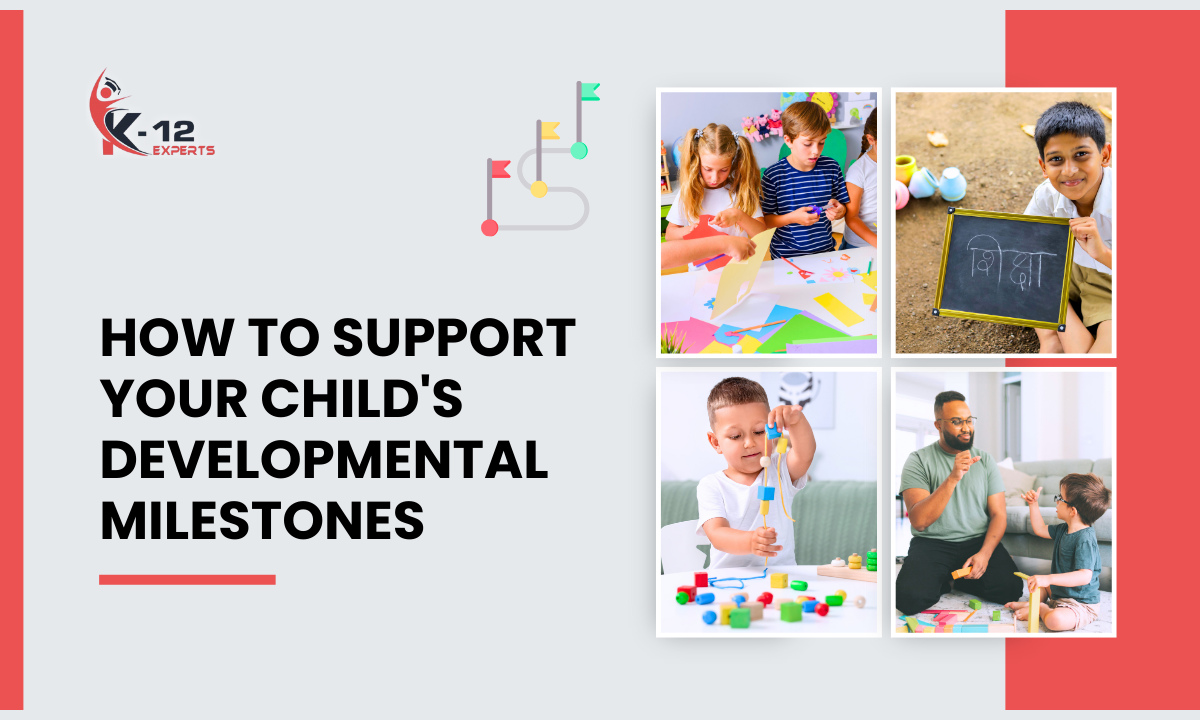Supporting your child as they reach new developmental milestones is crucial. It’s important to recognize each stage of their growth and know how to help them develop effectively.
For example, motor skills can be enhanced through various types of play. Structured play, like puzzle solving, helps with problem-solving skills, while unstructured play, such as playing in a sandbox, boosts creativity.
Understanding the balance between structured and unstructured play can significantly affect their cognitive development.
In the sections that follow, we will delve deeper into these topics. You’ll find practical tips and specific tools, such as educational toys like building blocks and storybooks, that can aid in your child’s learning.
These resources are designed to make your role in their development more effective and enjoyable.
Key Takeaways
- Help your child improve their hand-eye coordination and muscle control by engaging them in arts and crafts or puzzle-solving. These activities not only keep them entertained but also enhance their fine and gross motor skills, which are essential for everyday tasks.
- Boost your child’s language skills by frequently reading to them and introducing them to new words. This practice expands their vocabulary and comprehension, setting a strong foundation for effective communication.
- Design a playful and engaging learning space at home with various sensory activities like playing with textured toys or exploring sounds. These experiences are crucial as they stimulate your child’s curiosity and overall cognitive development.
- Support your child’s emotional intelligence by openly discussing and acknowledging their feelings. This helps them understand and manage their emotions, an important skill for personal development.
- Encourage your child to play games with others. This social play is vital for teaching them how to work in teams and develop interpersonal skills. Simple games like building a tower with blocks or team sports can be highly effective.
Each of these steps not only aids in your child’s current development but also lays the groundwork for their future growth, ensuring they gain essential life skills in a supportive and nurturing environment.
Understanding Key Developmental Milestones
Grasping key developmental milestones is crucial as it helps you support your child’s growth and learning effectively.
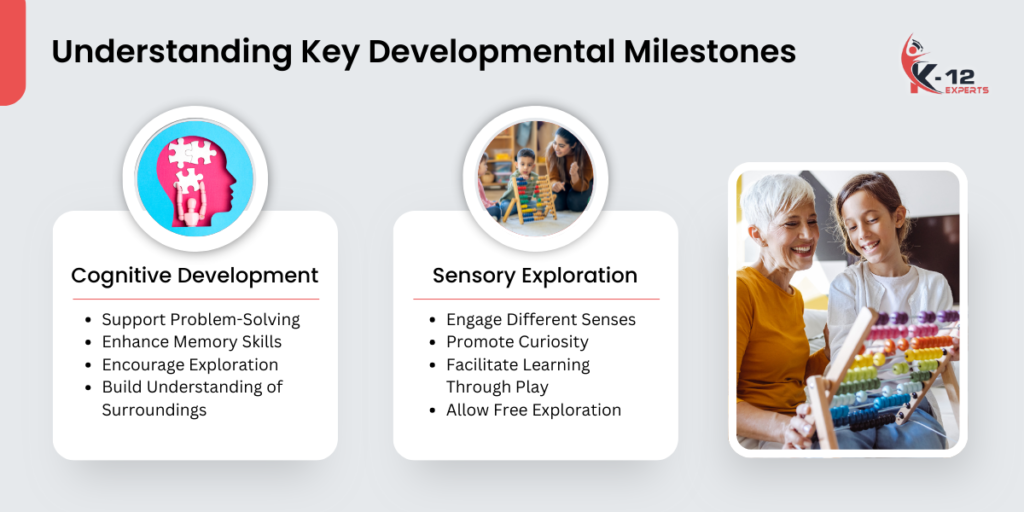
Emphasizing cognitive development and sensory exploration is essential. Cognitive development focuses on your child’s ability to think, explore, and solve problems, which includes remembering things and understanding their surroundings.
Sensory exploration, meanwhile, involves your child experiencing different textures, smells, tastes, and sights. This goes beyond simple play; it’s a vital part of learning.
Encourage your child’s curiosity, let them explore freely, and observe as they learn and develop through these engaging activities.
Enhancing Fine and Gross Motor Skills
To improve your child’s fine and gross motor skills, include enjoyable and straightforward activities in their daily schedule. Here’s a guide to help you:
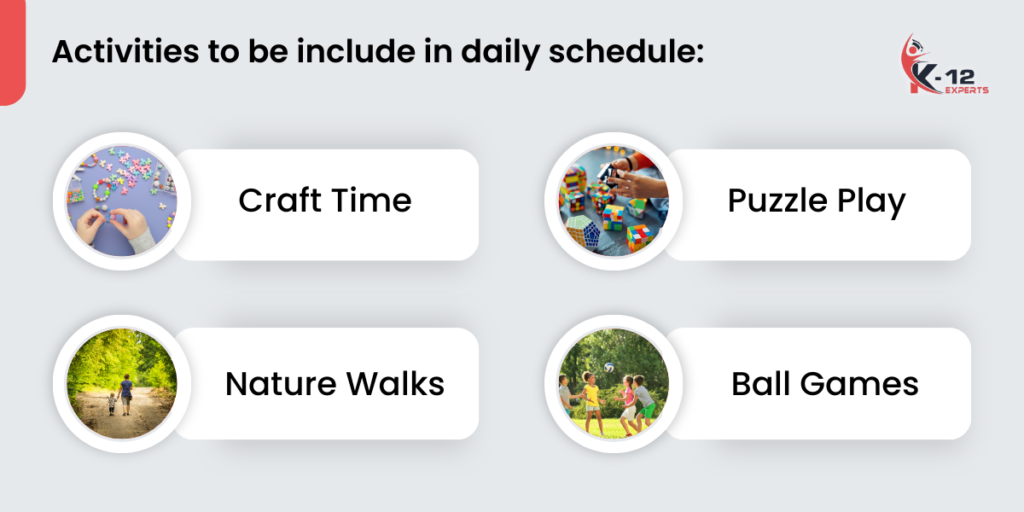
- Craft Time: Have your child work with small items such as beads or playdough. Handling these helps develop their precision in using their fingers and hands.
- Puzzle Play: Work on puzzles together. This activity not only challenges the mind but also enhances the coordination of small hand movements.
- Nature Walks: Take walks in the park to boost your child’s larger muscle groups. Activities like jumping over logs or walking along narrow paths improve balance and overall physical coordination.
- Ball Games: Engage in games involving throwing, catching, or kicking a ball. These are fun ways to improve hand-eye coordination and physical strength.
These activities aren’t only beneficial for skill development but also provide a wonderful opportunity for you to connect with your child through enjoyable times together.
Promoting Effective Communication Skills
Starting your child on the path to effective communication is a valuable step that prepares them for better interactions in the future.
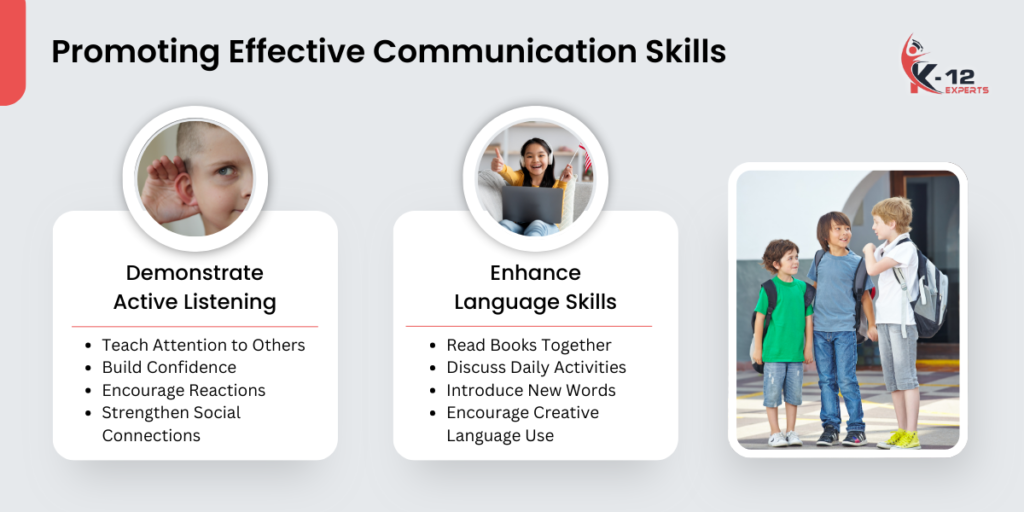
Begin by demonstrating active listening; show them that paying attention and reacting to what people say is crucial. This approach not only builds their confidence but also improves their ability to connect with others.
Enhance their language skills by providing diverse experiences. Read books together, discuss your daily activities, and introduce new words in engaging ways. These activities don’t just expand their vocabulary—they also teach them creative and thoughtful language use. Your involvement and excitement in these activities are key to developing their communication skills.
For example, while reading a children’s book like “Where the Wild Things Are” by Maurice Sendak, you can point out new words and ask your child what they think those words mean.
This not only builds vocabulary but also stimulates their imagination and reasoning skills.
Encouraging Social and Emotional Growth
Supporting your child’s social and emotional development is crucial, just like enhancing their communication abilities. By assisting them in understanding their emotions and forming positive relationships, you empower them to express their unique selves within a nurturing setting confidently.
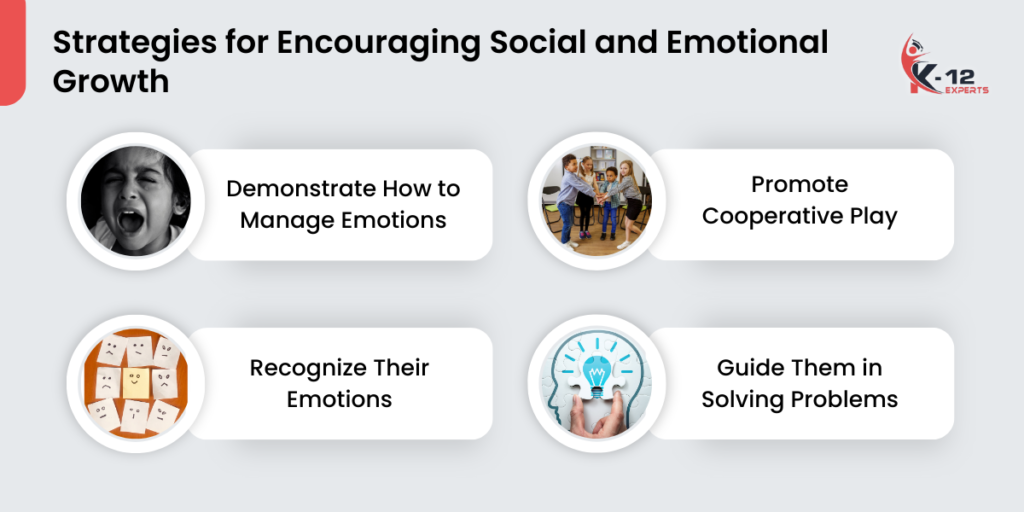
Here are straightforward strategies to support this growth:
- Demonstrate How to Manage Emotions: Show your child practical ways to handle feelings calmly and effectively. For example, when you feel frustrated, explain your thought process out loud about taking deep breaths or counting to ten to calm down.
- Promote Cooperative Play: Set up playdates or engaging group activities that encourage working together and sharing. This could be as simple as a board game that requires turns or teamwork, like building a puzzle together.
- Recognize Their Emotions: Make it a point to listen to and understand your child’s feelings without judgment. If they’re upset because they lost a game, you might say, “It’s really tough to lose, isn’t it? It’s okay to feel sad about it.”
- Guide Them in Solving Problems: Help your child think through problems and make good choices. When a disagreement arises with a friend, you could suggest, “Let’s think about why your friend might be upset and how you can talk it out together.”
These methods not only support your child’s current emotional well-being but also lay the foundation for robust interpersonal skills and self-awareness in the future.
Creating a Stimulating Home Environment
Supporting your child’s social and emotional development is crucial, but so is creating an engaging home environment that promotes learning and curiosity. You should design spaces in your home that encourage sensory play and creativity, ensuring your home becomes a place for exploration.
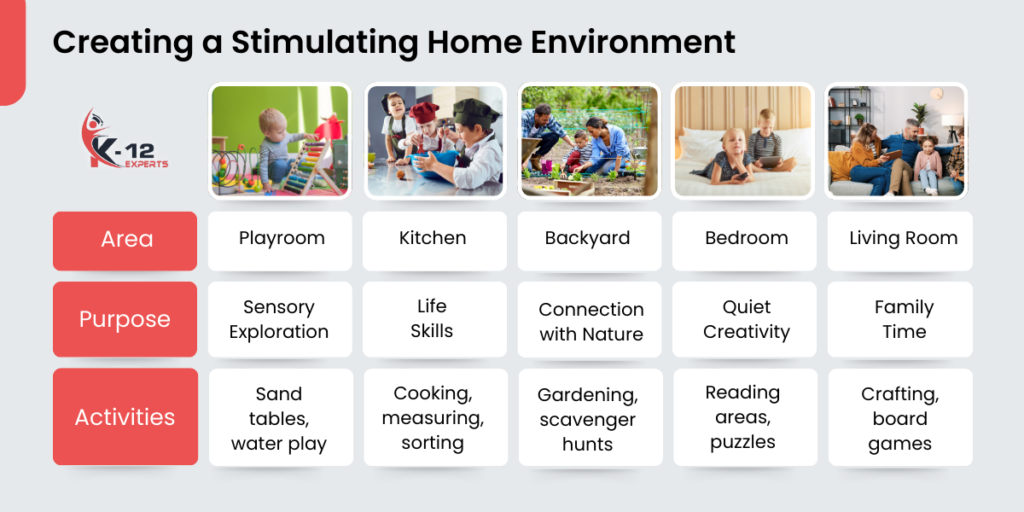
By transforming these areas, your home turns into a lively center for learning. Each space offers a new opportunity to ignite curiosity and support your child’s independence. Think of your home as a fun-filled playground!
Here’s why these spaces matter:
- Playroom: Engaging with textures like sand and water helps children develop sensory skills.
- Kitchen: Activities like cooking teach math through measuring and improve motor skills by chopping and mixing.
- Backyard: Being outdoors can spark an interest in science and nature.
- Bedroom: A quiet spot with books and puzzles encourages focus and problem-solving.
- Living Room: Shared activities here can strengthen family bonds and social skills.
Conclusion
As you help your child grow and learn, think of yourself as someone who helps plants grow. Give them the knowledge they need, like sunlight, encourage them often, and create a supportive home environment, which is like healthy soil for a plant. By doing these things, you help your child feel confident and ready to reach new milestones. Being actively involved in your child’s early years is crucial for their development.
For example, when your child starts to read, you can choose books that are appropriate for their age, like “Brown Bear, Brown Bear, What Do You See?” by Bill Martin Jr. and Eric Carle. Reading together not only helps with their literacy skills but also strengthens your bond with them.
Frequently Asked Questions
What if My Child Skips a Milestone?
It’s important to remember that children can reach developmental milestones at different times. You can help by interacting with your child in enriching ways and creating a supportive environment for their growth.
How Does Prematurity Affect Developmental Milestones?
Premature babies may achieve developmental milestones later than full-term babies, but early intervention programs can help bridge these gaps. Keep a close watch on your child’s progress and utilize resources to support their growth. Engaging with early childhood development specialists and regular check-ins with healthcare providers can address any delays promptly, helping your child reach their full potential.
Are There Gender Differences in Milestone Progression?
Gender differences in children’s milestone development exist due to societal norms. Understanding these differences can help parents and educators support each child’s development effectively by providing a mix of play activities.
When Should I Worry About Developmental Delays?
If you notice your child isn’t meeting milestones like walking or talking at the expected times, early intervention programs can help. Assessing your child early can provide a clear picture of the support they need. This proactive approach can aid in developing their skills effectively. For instance, if your child is late to start talking, early speech therapy can significantly improve their communication skills.
Can Too Much Screen Time Hinder Milestone Development?
Excessive screen time can negatively impact a child’s development. Limit screen time and encourage educational and interactive activities to support healthy growth and development.

